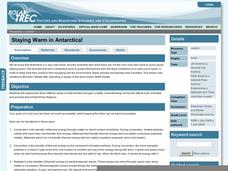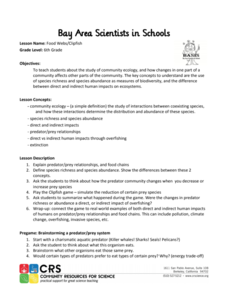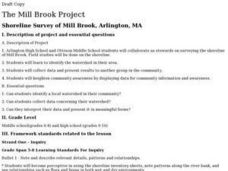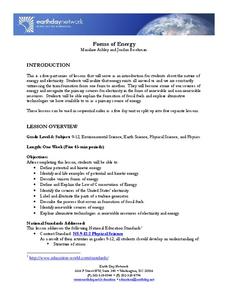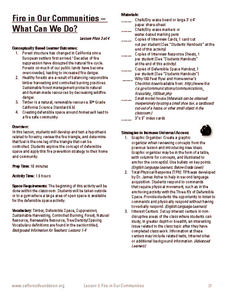Polar Trec
Staying Warm in Antarctica!
Has your class ever wondered how animals and scientists stay warm in the Polar Regions? Kids will investigate to understand the three types of heat transfer and how heat transfer affects those trying to stay toasty in sub-zero...
Hawaiʻi State Department of Education
Exploring Environments
Different animals live in distinct and specialized environments. Learners will discuss organisms and environments, and then create some using their dramatic art skills. They all act like animals in a marine environment. When they are...
National Science Teachers Association
Hop into Action
Young scientists find out what makes amphibians such unique and interesting animals in this simple life science lesson plan. After looking at pictures and discussing the characteristics of amphibians, learners complete a series of three...
Curated OER
Shadows & Light, Science & Puppetry
Lights, shadows, action, and inquiry await your artistic scientists. They explore the way light travels, absorbs, reflects, and transmits through shadow play. They create folktale-inspired shadow puppets, explore the science of light,...
Community Resources for Science
Food Webs/Clipfish
Human impact on habitats can be alarming. A hands-on activity has learners explore the impact of human interactions with different environments using a gamified approach. They simulate the impact of a species' abundance under different...
Minnesota Department of Natural Resoures
Getting to Know Trees
Celebrate the beauty of trees with a packet full of activities designed to help kindergarteners get to know about their leafy nature friends. Covering a variety of subjects, scholars go on a nature hike, read Shel Silverstein's The...
Science Matters
Blubber Gloves: It’s All About Insulation
Instill the concept of adaptation with the help of Blubber Gloves—ziplock bags, shortening, and duct tape. Scholars discuss how animals and plants keep warm in polar regions, record their predictions, and try on their Blubber Gloves to...
PBS
Breaking it Down
After challenging themselves to correctly choose the form of erosion and length of time required for a given landform to develop, earth science class members model mechanical and chemical weathering with various lab demonstrations over...
Florida International University
The Good, the Bad and the Nasty Tasting
Examine the benefits of chemical defense mechanisms. Organisms in oceans use chemicals to ward off predators. Duplicate this adaptation using a hands-on experiment in which you ward off your predators (your pupils) with some bad-tasting...
Chicago Botanic Garden
Faces of Climate Change
How does climate change affect you? First in a three-part series, the activity focuses on how individuals living around the world are affected by climate change. Individuals take on the role of a given character and share their...
Florida International University
Are You Concentrating?
Explore the importance of a concentration gradient in the rates of dissolution. Using the ocean ecosystem, learners study rates of dissolution around coral reefs. A hands-on experiment helps individuals discover the effects of changing a...
Curated OER
Oil Spill!
Fourth and fifth graders take a close look at oil spills and the devastating effects they have on the environment. They explore the various methods for cleaning up oils spills and perform and hands-on simulation of an oil spill in class....
Curated OER
Environment: The River Classroom
Seventh graders engage in hands-on experiments and activities dealing with rivers and greenways. They also observe lectures and demonstrations by experts in water and river restoration. Students and teachers participate in canoe trips...
Curated OER
Air and Water in the Environment
Learners explore the traits of water condensation and evaporation. In this water cycle lesson plan, students develop an awareness of the importance of water for sustaining life. Learners participate in a hands-on activity in which water...
Curated OER
The Study of Urban and Suburban Environments within the Mystic River Watershed
High school students examine their own water-based environments, within the Mystic Watershed. As the learners engage in inquiry-based, hands-on projects, critical thinking skills and problem-solving, the project will lead them to cross...
Curated OER
Erosion Mountain
Students investigate the erosive impact of water. In this erosion lesson, students research the impact of water on terraced and non-terraced hillsides. Students create an erosion model to have a hands-on experience with the soil.
Curated OER
Disguise for the Eyes
Young scientists discover how many, many animals use color as a way of helping them to survive in the wild. They understand how animals use color in their everyday lives. Pupils engage in hands-on activities, watch videos, access...
Curated OER
Fossils!
Students explore what fossils are, how they are formed, what different types there are and why they are significant to both our present and past geology history. They participate in a hands on fossil observation of their choice and...
National Park Service
Living & Non-Living Interactions
What better way to learn about ecosystems than by getting outside and observing them first hand? Accompanying a field trip to a local park or outdoor space, this series of collaborative activities engages children in learning about the...
Curated OER
Species and Specimens: Exploring Local Biodiversity
Students practice skills essential to all scientific investigation: carefully observing and collecting data. They become field biologists in a series of hands-on activities to collect and identify specimens, and survey and calculate the...
Earth Day Network
Forms of Energy
Give me a home where electric buffalo roam and I'll show you an ohm on the range. Introduction your classes to potential and kinetic energy, electricity, and renewable resources with a resource that combines observation, direct...
Curated OER
Wetlands Are Wonderful
Students study the characteristics of wetlands. They are introduced to terms and different examples of wetlands. The hands-on activity reinforces the different parts of the wetlands, and provides a working model of a wetland.
Cheetah Outreach
Introduction to Cheetah
Transform your classroom into the African savannah, a mountain range, the forest, and an urban environment! Young scientists embark on an imaginary field study observing various cat species in native habitats and recording in field guides.
Forest Foundation
Fire in Our Communities - What Can We Do?
Learn about defensible space and renewable resources with a lesson about forest fires. After exploring the ways that humans have impacted the environment, kids conduct mock interviews about differing points of view in the conservation...


